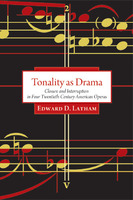Tonality as Drama
Closure and Interruption in Four Twentieth-Century American Operas
Author(s)
Latham, Edward
Collection
Knowledge Unlatched (KU)Number
100037Language
EnglishAbstract
This is an analytical monograph by a Schenkerian music theorist, but it is also written by one performer and enthusiast for another. Tonality as Drama draws on the fields of dramaturgy, music theory, and historical musicology to answer a fundamental question regarding twentieth-century music: why does the use of tonality persist in opera, even after it has been abandoned in other genres? Combining the analytical approaches of the leading music and dramatic theorists of the twentieth century--Austrian music theorist Heinrich Schenker (1868-1935) and Russian director Constantin Stanislavsky (1863-1938)--Edward D. Latham reveals insights into works by Scott Joplin, George Gershwin, Kurt Weill, and Aaron Copland that are relevant to analysts, opera directors, and performers alike. Latham reveals a strategic use of tonality in that repertoire as a means of amplifying or undercutting the success or failure of dramatic characters.
Keywords
Music; Cadence; George Gershwin; Konstantin Stanislavski; Kurt Weill; Primary tone; Tonic (music); Treemonisha; Voice leadingDOI
10.26530/oapen_625265ISBN
9781574413717OCN
621699410Publisher
University of North Texas PressPublisher website
https://untpress.unt.edu/Publication date and place
Denton, Texas, USA, 2008Classification
Music


 Download
Download